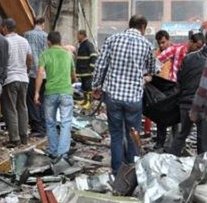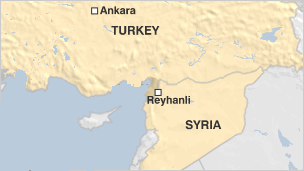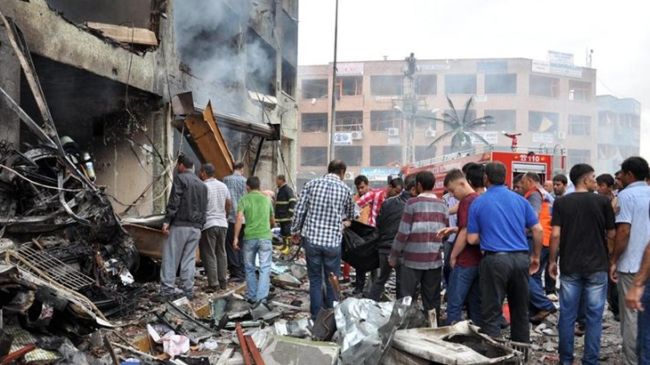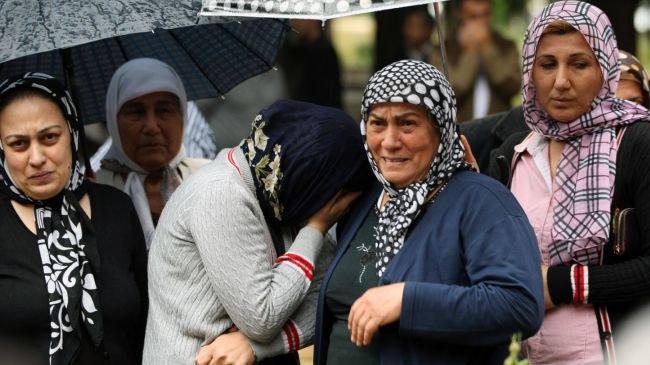

First published on PressTV, 12 May 2013 as Protesters tell Erdogan to resign. Other reporting (and misreporting) of Reyhanli terrorist bombing, and issues arising, includes: Information Minister: Turkey Bombings Terrorist Act Condemned by All Standards - SANA, Turkey blames Syria over Reyhanli bombings - Guardian, Turkey says Syrian forces behind border town bombings - Reuters, Dozens dead in Turkey car bombings - Brisbane Times, Turkey claims Assad loyalists bombed Reyhanli - , Blasts kill dozens in Turkish town Reyhanli on Syria border - BBC, Iran slams explosions in Turkish city of Reyhanli - PressTV.
Turkish protesters have called for Prime Minister Recep Tayyip Erdogan to step down following two car bombings in a town near the Syrian border.

Scores of people took to the streets of the town of Reyhanli in Hatay province on Saturday after more than 40 people were killed in two car bombings that jolted the town earlier in the day.
The angry demonstrators said the outbreak of violence was due to the Erdogan administration’s anti-Syria policy.
Security was tight in the center of Reyhanli, near the scene of the blasts, with the security forces setting up checkpoints to control entry into and exit from the town, witnesses said.
A similar demonstration was briefly held in Ankara, in which dozens of people marched in the street and chanted slogans criticizing Erdogan and Foreign Minister Ahmet Davutoglu.
Turkey has been one of Syrian President Bashar al-Assad's harshest critics and has supported the foreign-backed militants fighting to topple his government.
Turkish opposition parties have censured the Turkish government for its intervention in Syria’s internal affairs.
Last July, the leader of the Republican People’s Party warned the government against dragging the country into the “Middle Eastern quagmire” with its aggressive anti-Syria stance.
The Syria crisis began in March 2011, and many people, including large numbers of soldiers and security personnel, have been killed in the violence.
The Syrian government says that the chaos is being orchestrated from outside the country, and there are reports that a very large number of the militants are foreign nationals.
Editor's comment:
As has been explained on Twitter, "The province which was attacked supports the Syrian government." This is why that town was targeted by terrorists. The Turkish government and the mainstream media have not reported that protests against the Turkish Government have been held in the Turkish town of Reyhanli in which 46 were killed in the terrorist outrage of 11 May. Instead, unfounded claims, originating from the Turkish and U.S. governments, which try to attribute blame to the Syrian Government, have been reported. An example is the report Turkey blames Syria over Reyhanli bombings of 13 may in the Guardian The Syrian Government has condemned the outrage and comprehensively refuted any suggestion that it could have been behind the outrage.
Postscript: More Turkish protests against Erdogan over Reyhanli bombings
Adapted from Turkish protesters blame government for blasts from PressTV of 16 May 2013.

Relatives cry as pallbearers carry the coffin of Fehmi Karaca, 69, a shop owner killed in Saturday’s bombings, for burial in Reyhanli, Turkey, Sunday, May 12, 2013.
Hundreds of Turkish citizens have held demonstrations in the southern Turkish province Hatay and in the country’s largest city Istanbul to protest against Saturday’s twin car bombings, which killed 46 people and injured over a hundred others in the town of Reyhanli.
On Thursday, the protesters condemned the violence, noting that the outbreak of bloodshed was due to the Prime Minister Recep Tayyip Erdogan’s support for armed militants in Syria.
In Istanbul, the police used tear gas and water cannons to disperse the demonstrators who were marching towards the office of Erdogan.
A similar demonstration was held in Ankara on Saturday, in which dozens of people marched in the street and chanted slogans criticizing Erdogan and Foreign Minister Ahmet Davutoglu.
Turkey has accused Damascus of being behind the attack but Syria has dismissed the claim.
Syria Information Minister Omran al-Zohbi told a news conference on Sunday that his country "did not commit and would never commit such an act because our values would not allow that."
He blamed Ankara for the Saturday bombings in Reyhanli as well as the ongoing unrest in Syria by facilitating the flow of arms, explosives, vehicles, militants and money across the border into the Arab country.
"It is Erdogan who should be asked about this act... He and his party bear direct responsibility," Zohbi said.
The Syrian minister also stated that Turkey has planned the attacks to use them as a pretext to justify foreign intervention in Syria.
"Why this timing? Why these attack, just days before the meeting between Erdogan and (US President Barack) Obama? Does he (Erdogan), whose country is a NATO member, want to incite the United States (into intervening in Syria) by telling him his country has been attacked?" Zohbi said.
He added that the Turkish government has turned its border areas with Syria into centers for international terrorism.

Comments
Geoffrey Taylor
Sat, 2013-05-18 01:50
Permalink
Syrian Girl on the Reyhanli bombings
Another recent broadcast by the Syrian Girl is:
My Position On Syria and Government - Interview with Voice of Russia in London of 14 May 2013
Editor's note (25//2016): The above video has been removed from Youtube withno explanation.
See also:
I Wouldn't Mind Syrian Army Shelling my own House if FSA Occupies it: Mohamad from Aleppo of 16 Apr 2013.
Editor's note (25/6/2016): In place of the above video is the message: "This video is no longer available on Youube beccause the account associated with it has been terminated."/strong>
admin
Thu, 2013-05-30 04:54
Permalink
Sibel Edmonds on ever-changing Reyhanli bombing cover-up
Reyhanli-Gate: The Cover Up & Changing Story on the Turkey-Syria Border Town Bombing
Wednesday, 29. May 2013
Did the Rift between the Turkey’s AKP Government & Imam Fethullah Gülen’s Cult Lead to the Death of 52 Turkish Citizens?
By Peter Edel
Reyhanli, a town in the Turkish province of Hatay near the Syrian border, was hit last month by a double bomb attack – 52 dead victims, a sad record. Seventeen Turkish Marxists were arrested. Allegedly they committed the crime on command of the Mukhabarat, the secret police of the Syrian dictator6 Bashar al-Assad.
The criticism of the Turkish government regarding its policy on Syria became almost omnipresent in Turkey after the assault on Reyhanli. In the town itself a massive demonstration against the government resulted in a confrontation with the riot police. Ironically the large majority in Hatay voted for the ruling Justice and Development Party (AKP).
Many in Turkey hold to the opinion that the spilling of violence from Syria into Turkey follows from the decision of the government to grant the Syrian rebels active support. The critics have a point, for the fact that previous wars in neighboring countries did not cause Turkey much harm had everything to do with a passive government policy.
Empty hands
The Syrian regime strived to increase the pressure on the Turkish government and therefore ordered some sympathizing Marxists in Turkey to hit Reyhanli with two car bombs. At least, that’s the way Ankara makes it appear. It defies logic.
PM Erdogan, who is regularly begging Washington for an American war in Syria, was given a new argument with the tragedy in Reyhanli. Erdogan could use news like this after UN-investigator Carla del Ponte failed to find any evidence of the use of chemical weapons by the Syrian government.
Shortly before his visit to the US, Erdogan appeared to be empty handed, and It was only because of the double blast in Reyhanli that Erdogan could put something on the table in Washington. It’s not very credible that Assad did not take this scenario into consideration beforehand. OK, it was not very likely that Erdogan could persuade Obama to begin an open war in Syria anyway, but the possibility that Obama would compensate with more military support for the Syrian rebels could not be completely ruled out. Hardly imaginable that Assad was eager to achieve that.
Ediboglu
Mehmet Ediboglu of the Republican People’s Party (CHP), the leading opposition party in the Turkish parliament, claims that the arrested Marxists are innocent of what happened in Reyhanli. Reports suggesting they have confessed apparently do not make much of an impression on Ediboglu. This is understandable- confessions are not very relevant in Turkey considering Turkey’s reputation when it comes to ‘special interrogation techniques’.
According to Ediboglu the assault on Reyhanli was done by Jahbat al-Nusra, a Syrian rebel group allied to al-Qaeda, with ambitions to establish a Sunni regime in Syria. So, exactly what is the neo-Ottoman AKP-government in Turkey aiming for? This mutual objective coincides with numerous reports that al-Nusra receives weapons from Turkey.
Al-Nusra would prefer that Turkey deal with Assad once and for all. Erdogan would probably love to, but is reluctant as long as Obama is hesitant to throw the U.S. into a new war because of negative public opinion. Moreover, Erdogan and Obama are both scared of the efficient Syrian air defense system. Since Assad is making some progress in suppressing the rebellion against his regime, al-Nusra is running out of time.
Those are the circumstances under which the blasts in Reyhanli took place. It draws attention to certain developments; like Erdogan’s remark after Reyhanli that he won’t let himself be pushed into a war in Syria. In so far as he was referring to Assad this does not make any sense. For what can Assad gain with a Turkish offensive against Syria? Al-Nusra on the other hand, could only gain from this. So, it was most likely a slip of the tongue by Erdogan.
Besides, the blast in Reyhanli very clearly carries the signature of Syrian terrorists. It’s bizarre that on one of the cars a person was tied with copper wire.
So far only four Syrian’s were identified among the victims. Remarkable, if one takes into consideration that the ratio between Turks and Syrians is about fifty-fifty in the multi ethnic town. Not to mention the fact that the police in Reyhanli failed to close off the area after the blasts- Making it easy for evidence to disappear, or…. to appear.
Redhack
The situation became downright embarrassing for the Turkish government when the computer hacker group Redhack (1) released documents on the Internet of the Jandarma (Turkish rural military police). The information proved that the Turkish authorities were fully informed that al-Qaeda/al-Nusra was planning an assault with car bombs in Turkey against Syria. The Turkish government could not deny the authenticity of the documents, but it stayed with its position that the Assad regime was responsible for Reyhanli. In the framework of crisis management the government simply stated that it was privy to information the security services had no access to! Subsequently a Jandarma officer, who supposedly leaked to Redhack, was arrested. Redhack denied it had been in contact with this officer and campaigned for his release.
MIT/Police
Before Redhack entered the narrative, the police and MIT (the national intelligence service of Turkey) were putting the blame on each other for what happened in Reyhanli. MIT said it informed the police three days before the attack. The police argued that they had been at the point of making arrests, but didn’t because MIT told them to wait. That something went totally wrong also came to light in the mysterious transfer of the police chief of Reyhanli a few days after the bombing. In a statement by PM Erdogan before his departure to the U.S. he mentioned a ‘communication problem’ between security services in Reyhanli and announced an investigation.
The fact that MIT-leader Hakan Fidan is Erdogan’s confidant and that followers of the U.S. residing imam Fethullah Gülen have much influence within the police force, are of course very special details in all of this. Especially, since the conflict (2) between Erdogan and Gülen has become more apparent lately – the almost undisguised attacks on each other by their mouthpieces in the media leave little doubt about that. Observers (3) in Turkey are quite sure that the ‘communication problem’ between MIT and the police could very well be seen as the next chapter in the rift between the PM and the preacher.
Gülen, who mostly keeps in line with Washington positions, is annoyed by Erdogan’s intention to visit Gaza and the West bank. Moreover, he has reservations about the talks between MIT and PKK-leader Abdullah Öcalan. At first Gülen endorsed this ‘peace process’, although it didn’t seem to be with full belief. He may have said so because Washington expected it from him. No doubt he’s wary about a decrease in his movement’s influence in the Kurdish part of Turkey, following a deal between Erdogan and the PKK. Remarks in the Gülen-media are quite indicative of this.
A Gülen-Party?
There are many issues between Erdogan and Gülen. Last week Erdogan’s former spokesperson Fehmi Koru was among the observers who asserted that the Gülen-movement is considering its own political party in Turkey, out of discontent with Erdogan’s AKP. Remarkable, if one takes into consideration the statements of Gülen that his movement is not of a political nature. On the other hand, political is exactly the word to describe the movement, as it has been that way since its early days. It goes without saying that such a party would be a heavy burden on Erdogan. It could easily make him lose half, or even more, of his votes.
Whether it will come to this is something for crystal gazers. What concerns us right now is whether the conflict between Gülen and Erdogan contributed to the reasons the bomb attack in Reyhanli was not prevented. In any case, after the bloody event it was time for deliberation on the highest level. The first rumor had it that Erdogan would go to Pennsylvania personally to meet Gülen during his stay in the U.S. But that was out of the question, if only because according to Turkish customs he would have put himself under Gülen as his guest.
So, Erdogan send his deputy PM Bülent Arinc instead. In his statement (4) concerning the meeting Arinc denied any conflict between the government and Gülen, merely adding that ‘he wants us to show sensitivity on regional as well as international issues.’ At around the same time Gülen’s loyal columnist Ekrem Dumanli (5) went in full denial mode of a conflict as well. All this is entirely insignificant, of course. But on neither side was there any sign of leaking to the media, and that’s an indication of a certain understanding. That’s why it’s my bet that we’re not going to hear much about the rift between Erdogan and Gülen for some time. However, it’s unlikely that the status quo will remain very long. The mutual lust for power of the PM and the preacher will most probably insure that they will find each other in each other’s way again soon.
# # # #
Peter Edel is an analyst and investigative journalist based in the Netherlands. He is a regular contributor to Boiling Frogs Post.
Notes
1. http://redhack.tumblr.com/post/51069851247/turkish-intelligence-services-was-aware-of-the-bombs
2. http://turkishinvitations.weebly.com/new-power-struggle-emerging-in-turkey.html
3. http://www.hurriyetdailynews.com/towards-an-intelligence-state.aspx?pageID=449&nID=47632&NewsCatID=406
4. http://www.hurriyetdailynews.com/islamic-scholar-gulen-asked-government-to-be-more-careful-deputy-pm-arinc-.aspx?PageID=238&NID=47443&NewsCatID=338
5. http://www.todayszaman.com/columnistDetail_getNewsById.action?newsId=316612#.UaMGXS_tE8I.twitter
6 ↑ Too many articles, which argue the case in support of Syria as this article rightly does, seem to also include an obligatory labelling of President Bashar al-Assad as a 'dictator' and 'corrupt'.
It appears to me that many Syrians who claim to oppose the Syrian Government because of its alleged corruption are acting for the enemies of Syria -- the United States government, and the Arab dictatorships and Israel and hence traitors, and hence, by definition, far more corrupt than anyone defending the Syrian Government could possibly be.
Whilst the Syrian government may not be without serious flaws, President Assad still strikes me as a man, who is far more courageous, kind and decent than any of the rulers or 'elected' national leaders opposed to him on the international stage, such as Australia's Foreign Minister Bob Carr. (Had Assad ruled Syria, as ineptly and unconscionably as Carr ruled the State of New South Wales as Premier from 1995 until 2005, his government would have long since been overthrown.)
I think the time has long since past when these labels should have been dropped and Assad and those around him be given credit for the courageous and inspired leadership they have shown against the terrorists and their masters. Also, I think it is time that those who wish to make the truth about Syria known, refrained from labelling the Syrian government the 'Syrian regime'.
Add comment